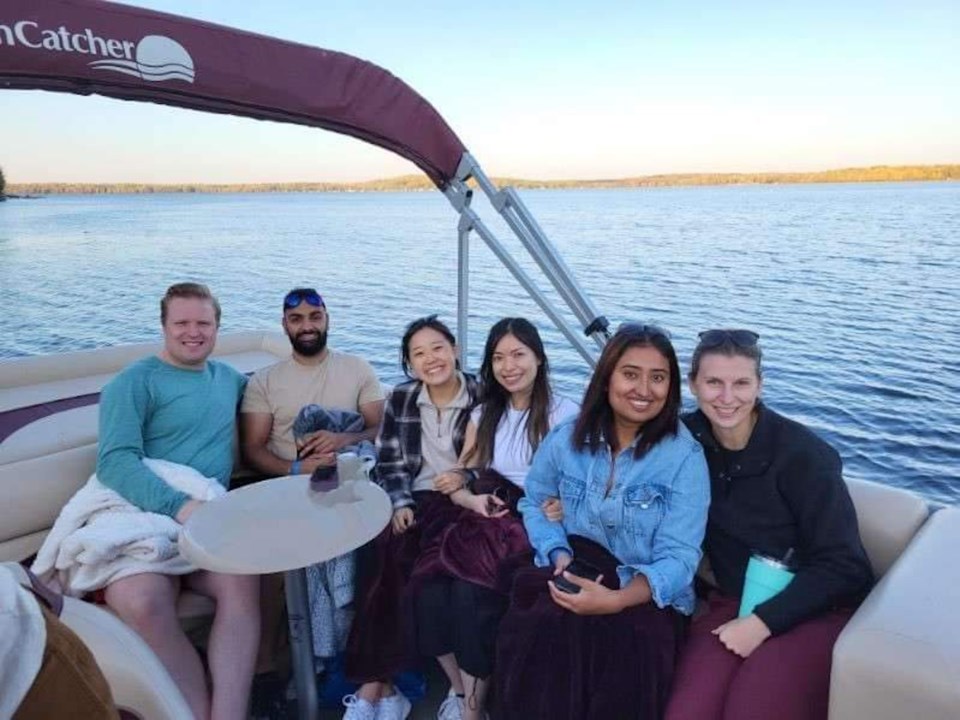ATHABASCA – A group of medical students from the University of Alberta got an opportunity to learn what rural medicine is about in September, when they spent a month in Athabasca as part of a pre-clinical program.
The six students — Reid Collins, Ajay Sidhu, Judith Rho, Judy Deng, Simran Parmar, and Meagan Eckel — were part of the University of Alberta’s Pre-clinical Network Medical Education (PNME) program, which is the first opportunity the second-year students get to work in an in-patient setting.
“The first two years are academic learning; talking about medicine, learning about medicine, but not actually practising,” said Dr. Ryan Schaub, who was responsible for the group during their placement. “The goal is to get them some clinical exposure to get them more comfortable in a clinical setting, and to get them some early rural experience and pique some interest.”
Rural medicine is challenging in its own way; often doctors are working with less resources and have to be more self-reliant.
All six students said the experience had improved their view of rural medicine and made them seriously consider it as an option.
“It’s unique here because there’s just one physician in the ER at a time, and they have to do it all,” said Eckel during a Sept. 26 group interview. “You don’t know what’s walking through the door, so you need to be innovative and resourceful with what you’ve got.
“I think one of the challenges with rural medicine is that not everyone has access to a doctor since the waitlists are so large, so the hospital catches a lot of different things,” said Sidhu. “That variety is something that’s very important to me in terms of my career, so it’s definitely something that interests me.”
The students spent the month — they arrived Sept. 5 and finished the program Sept. 29 — working with Dr. Schaub, but they took the opportunity to thank the entire hospital for taking them under their wing, something they indicated didn’t always happen.
“He gave us a lot of freedom to learn and take the lead. It wasn’t just shadowing, it felt like we were working with him in the clinic, and that wasn’t an experience I’ve had so far,” said Parmar.
“We also have to give kudos to the rest of the physicians, for allowing us to shadow them as well,” said Collins. “There were a number of doctors who we got the opportunity to work with and they were all great.”
This was the first time Athabasca had taken part in the program; other rural communities including Sundre and Peace River are popular destinations, but some community leaders figured, ‘Why couldn’t Athabasca join them?’
“There’s no reason we couldn’t fall into that category, if people know about it and we create that really good culture and build this program,” said Schaub. “If they have a really good experience and go back and tell their classmates, maybe we can draw some significant interest.”
Mayor Rob Balay was a major component of the non-medical side of things; he had joked during a summer council meeting that his goal was to keep the students as busy as he could, and it looks like he succeeded; when asked about their favorite experiences over the month, a quadding trip and combining came up multiple times.
“We wanted to give them experiences that they hadn’t had before, to try and show them that ‘This is what life as a rural doctor could look like’,” said Balay in a Sept. 29 interview.
The efforts made by Balay and the community as a whole were appreciated by the students, who all agreed the month had opened their eyes to the potential benefits of working as a rural family doctor.
“We all just want to say thank you to Rob, he’s just been awesome,” said Parmar.
“He’s a huge advocate for this community, and he’s doing a fantastic job,” agreed Eckel. “It really shows how much he cares about the community as a whole.”
While Balay hopes that one of the students will end up as a doctor in Athabasca at some point, he acknowledged nothing they did was specific to Athabasca — if the students end up in any rural setting, it’s still a success.
“Part of the whole AHS strategy that they need to adopt is to train and expose medical students to rural settings, and they’ll have a much better chance attracting them back after their schooling is done,” said Balay. “We’ve got to start doing that to switch the norm of everyone going back to those big urban centres.”



